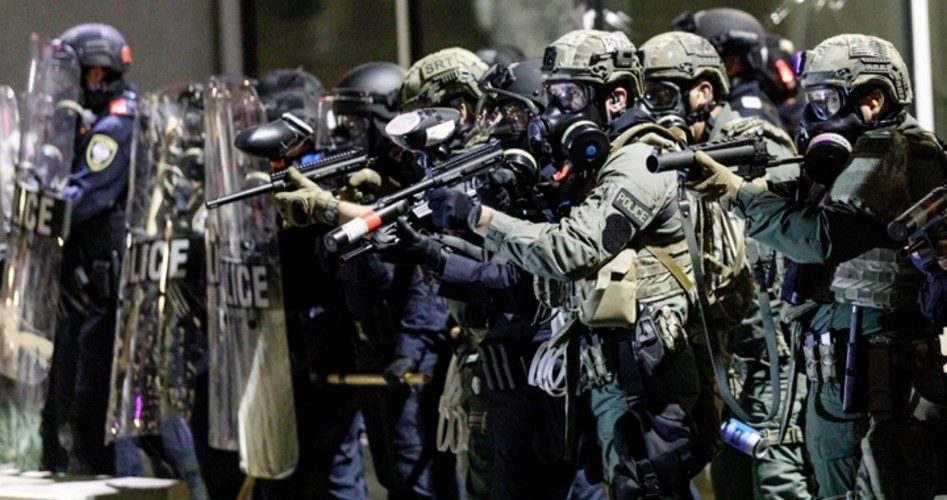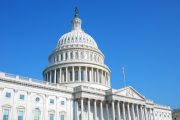
Since May 29, Portland has endured rioting by “mostly peaceful protesters” that has cost tens of millions of dollars in damages, caused dozens of injuries, and has now taken the life of an unarmed Trump supporter, who was shot by an Antifa thug.
Democrat Portland Mayor Ted Wheeler initially downplayed the violence, saying, “What we’re witnessing is a truly extraordinary moment in our country. People are uniting to support our black community. Yes, again, there were a limited few who stayed behind to attempt to wreak havoc, but they were encouraged by demonstrators to stop taking away from their message. Demonstrators set the tone for peace and non-violence.” Then he blamed President Trump for it. Wheeler’s claim that the presence of federal agents in Portland caused violence proved false, as the protests didn’t stop when those agents left. He eventually acknowledged the violence when he decided to move from his $840,000 downtown condo after some “peaceful protestors” tried to burn it down. He later commented: “When you commit arson with an accelerant in an attempt to burn down a building that is occupied by people who you have intentionally trapped inside, you are not demonstrating; you are attempting to commit murder.”
Funny how burning, looting, vandalizing, and violence are acceptable ways to protest “racial injustice,” as long those things are being done to someone else’s property.
Wheeler’s partner in crime is Multnomah District Attorney Mike Schmidt. With a long history of supporting progressive causes, Schmidt issued a free pass to all but the most violent of rioters “to promote a safe community and reduce the negative and lasting impacts a person can experience once involved in the criminal justice system following an arrest resulting from a peaceful protest or mass demonstration.”
Schmidt’s decision caused the Oregon State Patrol (OSP) and other police agencies to withdraw their officers from Portland. Washington County Sheriff Pat Garrett stated the obvious when he said: “At this time, I do not plan to send deputies to work directly in Portland. The lack of political support for public safety, the uncertain legal landscape, the current volatility combined with intense scrutiny on the use of force presents an unacceptable risk if deputies were deployed directly.”
To circumvent President Trump’s plan to redeploy federal agents to Portland, Oregon Governor Kate Brown has authorized the deputizing of a detachment of state police officers to serve in lieu of federal officers in the beleaguered city.
U.S. attorney’s office spokesman Kevin Sonoff stated, “Select Oregon State Police troopers have received special deputation by the US Marshals Service,” enabling them to detain and arrest protestors “when necessary, to protect and defend federal government buildings and personnel during a civil disturbance.”
By doing this, the officers can now sidestep Schmidt’s protestor protection program by bringing suspects to federal courts for arraignment and prosecution.
Brian Higgins, a retired police chief of Bergen County, New Jersey, and current adjunct professor at the John Jay College of Criminal Justice in New York, said this use of federally deputized officers to pursue federal charges against rioters “is probably a new approach in the conflict that’s going on in criminal justice right now between prosecutors and law enforcement.” He continued, “It almost appears to me as if this lack of charging or downgrading charges in protests, particularly in charges related to assaulting police officers [by progressive local prosecutors], may contribute to more assaults against police officers because protesters think that they just will not be held accountable.”
Higgins also said the federally deputized state troopers “might be a good option for law enforcement” there, and that “in certain areas where there is this conflict between prosecutors and law enforcement, I wouldn’t be surprised if it’s done again.”
While Higgins does not expect this tactic to “take off across the country … most law enforcement executives are sitting up a little straighter and taking notice right now,” he said. Also noting that federal officers have much broader rules regarding the use of force than local police do. “I would caution that [the allowance of two different use-of-force limits] not be the norm.” Because it is “kind of a slippery slope,”
“That’s a concern, and it’s why we don’t have a uniformed federal law enforcement agency throughout the country,” he said. blim
“It shouldn’t come to this, quite frankly,” Higgins continued. “There should be more of a consensus between prosecutors and law enforcement, and more about public safety and a lot less about politics.”
Higgins is on to something when he warns about this slippery slope. While the temptation to embrace this expansion of federal power and jurisdiction over state and local authority exists, it is a dangerous precedent to set. Once the feds have this authority, they will never relinquish it, and while many believe Trump is standing as a bulwark against an overwhelming liberal power grab, he will not always be in office. So the power we give him today is the power that a progressive president could wield in the future, and that should terrify anyone.



